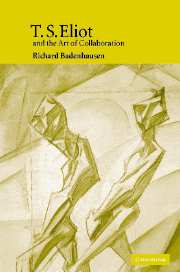Book contents
- Frontmatter
- Contents
- Acknowledgments
- List of abbreviations
- Introduction – Reaching the stillness of music
- 1 “Speaking as ourselves”: Authorship, impersonality, and the creative process in the early essays
- 2 A conversation about “the longest poem in the English langwidge”: Pound, Eliot, and The Waste Land
- 3 “Helping the poets … write for the theatre”: The transitional essays on collaboration, community, and drama
- 4 A dramatist and his midwives: Eliot's collaborations in the theatre
- 5 The Possum and the “creating critick”: Eliot's collaboration with John Hayward
- Conclusion – Placing collaboration in perspective: Voice and influence in the late essays
- Notes
- Index
3 - “Helping the poets … write for the theatre”: The transitional essays on collaboration, community, and drama
Published online by Cambridge University Press: 22 September 2009
- Frontmatter
- Contents
- Acknowledgments
- List of abbreviations
- Introduction – Reaching the stillness of music
- 1 “Speaking as ourselves”: Authorship, impersonality, and the creative process in the early essays
- 2 A conversation about “the longest poem in the English langwidge”: Pound, Eliot, and The Waste Land
- 3 “Helping the poets … write for the theatre”: The transitional essays on collaboration, community, and drama
- 4 A dramatist and his midwives: Eliot's collaborations in the theatre
- 5 The Possum and the “creating critick”: Eliot's collaboration with John Hayward
- Conclusion – Placing collaboration in perspective: Voice and influence in the late essays
- Notes
- Index
Summary
One of the most dependable patterns in Eliot's career is his habit of following one of his own poems or dramas with an essay that explores the procedures of that creative work. This allowed Eliot to gain some distance from the imaginative act and explore the troubling process of creation in the comforting form of prose, where he could assert his opinions much more vigorously and, following Arnold, use criticism to establish order. Since The Waste Land took shape during one of the most turbulent times in Eliot's personal life and it was the first work to benefit from a full-blown collaboration, Eliot was especially eager to make sense of that undertaking in his own criticism that followed the long poem. And while these essays have sometimes been discussed in terms of Eliot's thinking in The Waste Land, placing them within the context of the collaborative model I have drawn up puts them in a drastically new light. In effect, they reveal Eliot wrestling with the implications of Pound's assistance and struggling to align Pound's editorial contributions with his own needs and fears as an artist. Unwilling to acknowledge Pound's assistance overtly, the essays express Eliot's seemingly conflicting impulses of preferring to configure the writer in a passive position in the creative act while at the same time allowing for the exercise of authority. Part of the motivation of the essays, then, seems to be a desire to resolve this contradiction.
- Type
- Chapter
- Information
- T. S. Eliot and the Art of Collaboration , pp. 111 - 141Publisher: Cambridge University PressPrint publication year: 2005



